MDIFW Blog
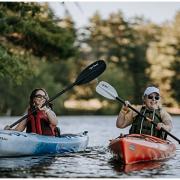
Maine River Trips
Paddling along Maine’s many water ways is a favorite pastime for anglers and anyone who enjoys the serenity of being on the water, turning around bends only to share the river with wildlife and the splash of a rising fish. Here are a few trip ideas throughout the state, with varying lengths and difficulty levels. Before you go, always do you research and plan ahead. You may need to consult a gazetteer and other resources before making the trip. And always tell someone where you are going, and when you plan to return.
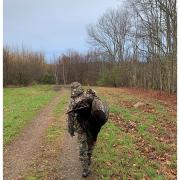
New Turkey Hunters Tell Their Spring Success Stories
The weather is hot and it feels like spring is far behind us. But the spring turkey hunt just wrapped up five days ago on June 5th. With an overall lift in outdoor recreation in Maine, we’re seeing more and more new hunters on the landscape. For many, this is just another opportunity to get outside and connect to nature, a key element to good mental health. New turkey hunters are seeing the benefits of spending time outside with friends and family, even if they don’t harvest a bird. A successful hunt doesn’t always end at a tagging station—but sometimes it does!
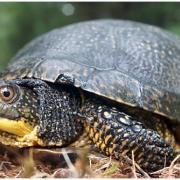
Turtle Talk
Maine has eight species of semi-aquatic turtles that inhabit a number of regions and ecosystems across the state. Turtles are a unique group of reptiles, with an anatomical design that ensures protection from a number of predators. A turtle’s shell, or carapace, is made of hard bony plates covered in scutes, which are the same material as our fingernails. Fused to the inside of their shell is their spinal column and the belly side of the turtle shell, the plastron, are the fused ribs and sternum. So, a turtle’s shell is a unique armor that a turtle physically cannot live without.
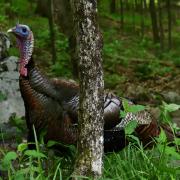
The Tick and Turkey Debate
Turkeys and ticks have long been a topic of conservation, with Maine’s wild turkeys sometimes taking the blame for causing problems for Maine’s moose as a spreader of ticks, the proliferation of ticks in Southern Maine, and the negative impacts on humans that come with the ectoparasite.
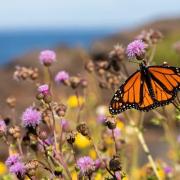
Mowing for Monarchs
Butterflies are a fan favorite when it comes to fluttering invertebrates, and in addition to their beauty, they bring a number of benefits to our lives. Butterflies play an important ecological role as prey to a number of larger species such as dragonflies and birds and are vital pollinators for wildflowers.
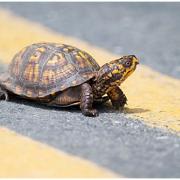
Turtle Crossing
Turtles are long-lived animals that take many years to reach reproductive ages, in the range of 10-15 years for many Maine turtles. Their delayed maturity coupled with low hatching success creates exceptional challenges for survival. The annual loss of just a few adults to roadkill can lead to a population decline or even local extinction.
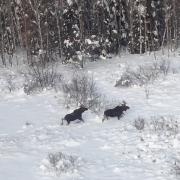
Monitoring Moose from the Skies
If you spent any time snowmobiling in certain areas of northern Maine this winter, you may have looked up to see a low flying helicopter scouting over the trees. This helicopter carried one Forest Pilot Ranger of the Maine Forest Service and three of Maine’s wildlife biologists, including the moose biologist, Lee Kantar on their annual aerial moose counts. From late December to mid-February, having snow on the ground allows greater contrast of moose on the landscape, making it easier to spot them while flying. The helicopter flies over specific sections in districts that best represent Maine’s core moose range and habitat.
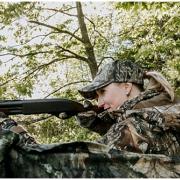
Turkey Hunting: The Shot and Next Steps
The Department concluded a three-part spring turkey hunting panel discussion series on April 7, 2021. In the final episode of this series, three MDIFW staff members and avid turkey hunters retired Rec Safety Coordinator Reggie Read, Wildlife Special Projects Coordinator Bob Cordes, and current Rec Safety Coordinator Jasmine Pomerleau discussed the key features of the shot and after the shot.
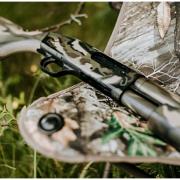
Turkey Hunting Gear
As part of a panel discussion series concluding April 7, 2021, the Department hosted a live panel discussion on March 31 with three MDIFW staff members and avid turkey hunters: Fisheries Resource Supervisor Liz Thorndike, retired Rec Safety Coordinator Reggie Read, and Wildlife Special Projects Coordinator Bob Cordes. This conversation focused on turkey hunting gear and calls.
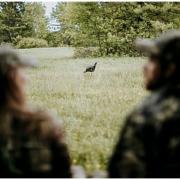
Understanding Spring Turkey Behavior + Scouting Tips
Spring turkey hunting is an excellent way to celebrate the end of winter. It’s a fun, interactive hunt, providing plenty of opportunity across the state. On March 24, the Department hosted a live panel discussion with three MDIFW staff members and avid turkey hunters: Turkey + Other Game Bird Biologist Kelsey Sullivan, Fisheries Resource Supervisor Liz Thorndike, and retired Rec Safety Coordinator Reggie Read.
Keep In Touch!
Enter your email or mobile number to receive the latest news from MDIFW.